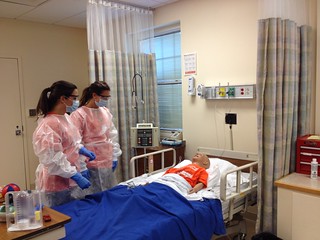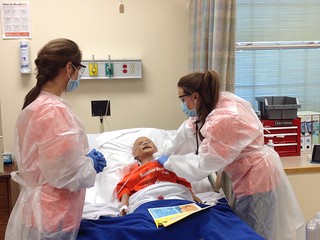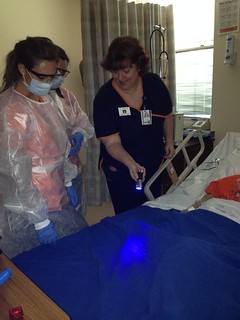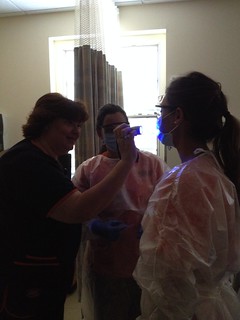Auburn School of Nursing simulates treatment of patient with Ebola and other infectious diseases
Article body
For the past four years, Auburn Associate Professor Teresa Gore has used a simulated exercise to teach students how to treat patients with infectious diseases. This year, senior nursing students participated in a simulation of how infectious diseases such as Ebola can easily spread to health care workers through patient care.
On Thursday, Oct. 30, the simulation lab in Miller Hall became a treatment center where students cared for a manikin (simulated patient), a 9-year-old boy named Jason who has cystic fibrosis and is suffering from bacteria-resistant pneumonia.
"Infection control is an abstract concept, and with this simulation it becomes a concrete experience for learning," Gore said. "The objectives of the simulation were to learn how to implement appropriate isolation techniques. This simulation shows the reality of the ease of transfer of this disease."
All 77 students in the senior class went through this training. "We make sure we are covering the main concepts so that each student gets the same type of experience," Gore said.
After participating in the training, student Allison Gilpin said she now understands the significance of how infectious disease can be spread.
"It's very important to protect yourself and the patient because you don't want to carry home any of the patient's germs, and you don't want to bring in any of your own," Gilpin said. "We need to get a good grasp on that before we go out into the real world where we will see it every day in the hospital."
"Glo Germ," a lotion that glows under UV lighting, was administered to surfaces on and around the patient, simulating where Jason had spread the pneumonia. Students, wearing isolation attire, administered care without knowing what had been contaminated.
"Remembering what to put on first and what to take off first makes a difference when dealing with contamination," Gilpin said. "If you put your mask on before you put your gloves on, you have contaminated your mask. It is very important to remember the process."
After the treatment, Gore used a UV light to show the students where the disease was on the patient and equipment and where it had transferred to them.
Student Brittany Trammell said this type of training is helpful to her as a student before entering into a profession that deals with infectious disease.
"We talk about what order to put all of our equipment on and to be aware that even just touching your mask spreads the germs to yourself," Trammel said. "No one wants Ebola, and no one wants to be sick, but the best thing you can do is to protect yourself and protect the patient by doing all the things we know to do, following the CDC guidelines and all the isolation precautions that we can."
Gore said students need to see that it is not only the patient who has the infection, but that the entire room could be infected.
"You have to be able to see it to understand it," Gore said. "Every semester we are working on patient and personal safety."
Gore said with the Ebola outbreak, this is a good time to use real situations in the simulation. "With Ebola, there may be more equipment that is now being used because the nurses contracted the disease, but it is the same principle— that you have to protect yourself," she said. "That is what we are teaching here, so they can carry it out into their professional practice when they graduate."
During this senior semester of nursing school, students focus on how to prevent infection and the spread of disease.
"I think we are getting the best training possible," Trammell said. "Our teachers have done a really good job at keeping us abreast of all the situations and how to best protect ourselves and protect the patients."
Related Media
Related Links
Media interested in this story can contact Communications Director Preston Sparks at (334) 844-9999 or preston.sparks@auburn.edu.
Auburn University is a nationally ranked land grant institution recognized for its commitment to world-class scholarship, interdisciplinary research with an elite, top-tier Carnegie R1 classification, life-changing outreach with Carnegie’s Community Engagement designation and an undergraduate education experience second to none. Auburn is home to more than 30,000 students, and its faculty and research partners collaborate to develop and deliver meaningful scholarship, science and technology-based advancements that meet pressing regional, national and global needs. Auburn’s commitment to active student engagement, professional success and public/private partnership drives a growing reputation for outreach and extension that delivers broad economic, health and societal impact.








